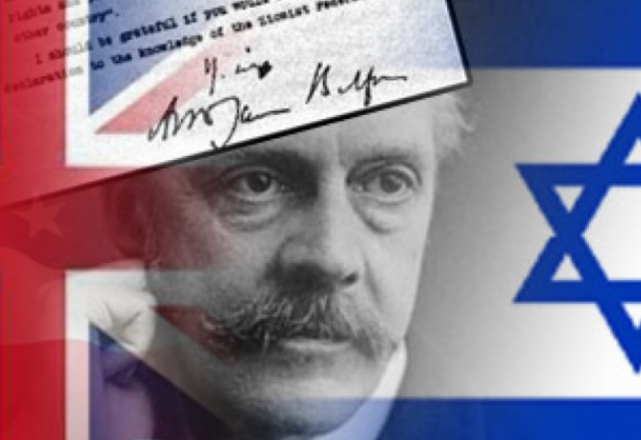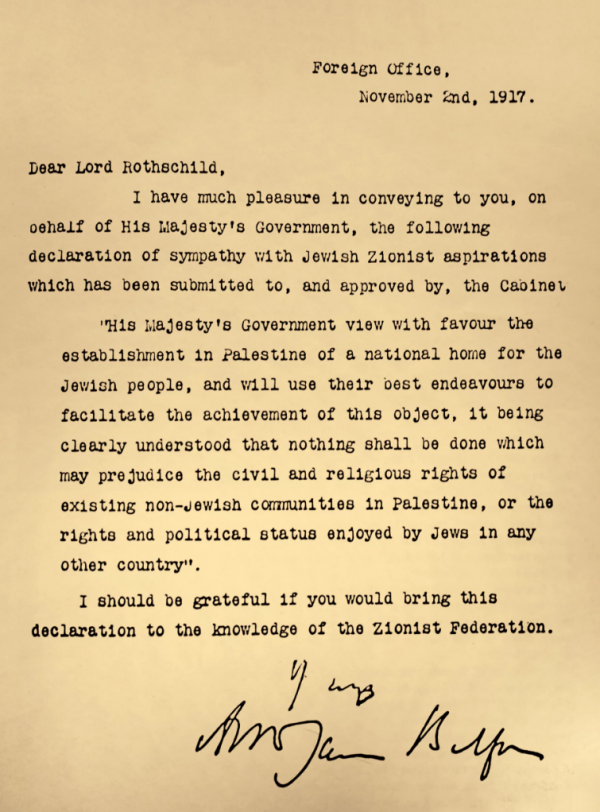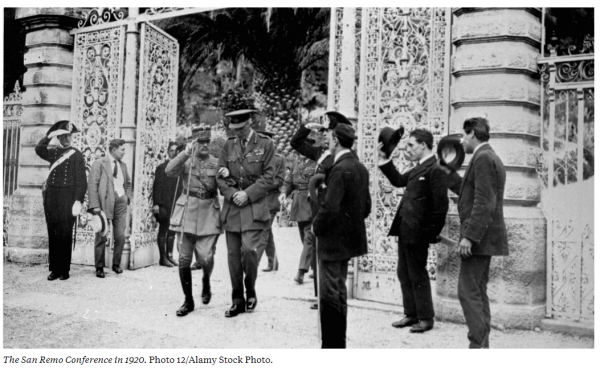Today—November 2, 2017—Great Britain, Israel, Zionist Jews across the planet and their supporters, will commemorate and celebrate the 100th anniversary of the Balfour Declaration, a major milestone in the international community’s recognition of the Jewish people’s right to self-determination in the land of Israel.
This week @IsraeliPM Netanyahu will visit UK to meet w/ @theresa_may at @Number10gov & mark the Balfour Declaration’s centenary #Balfour100 pic.twitter.com/Vr6ksNDdmm
— Mark Regev (@MarkRegev) October 30, 2017
The Balfour Declaration was a short communique—a mere 67-word note—delivered by then British foreign secretary Arthur James Balfour to Lionel Walter, Lord Rothschild, who represented the British Jewish community at the time.
In it, Balfour expressed sympathy for Zionism—embodied in the commitment of the British government to “view with favour the establishment of a national home for the Jewish people” in the Holy Land.
This historic pledge, made a century ago today, that Great Britain would use its “best endeavors to facilitate the achievement” of a Jewish national home has long been viewed by Palestinians and Israel’s detractors as an unjust “calamitous promise”, a “pernicious piece of paper” and an “act of betrayal and perfidy” that imperial Britain foisted on the “indigenous” Arab population of Palestine.
But the reality is that Balfour could’ve never made his government’s promise to the Zionists had the other great powers of the day not approved of it as well.
Why the Balfour Declaration Wasn’t a British Colonial Land Grab
The Balfour Declaration wasn’t merely a letter of British government intent to revive Jewish sovereignty in the Holy Land. It also reflected the consensus decision and coordinated policy of all the Allied powers—including the U.S., France and Russia—to confer legitimacy on the Zionist cause and to “restore Jewish statehood” in the one place on earth where the Jewish people had once been sovereign.
You can watch here several recently released videos that correct the misnomer that Balfour’s public statement of support for Zionism was an example of imperial transgression. In fact, it was—as Lord Rabbi Jonathan Sacks remarks in the video below—the “ultimate anti-imperialist gesture”:
So the Balfour Declaration was “more than the promise of one nation.” As historian Martin Kramer notes in an important recent article revisiting the document, “by affirming the right of any Jew to call Palestine home, it also changed the international status of the Jewish people” (Kramer sees the Balfour Declaration as roughly comparable to a UN Security Council Resolution today).
This wide international support for Zionism helped the movement to evolve from a contested, fringe political group with a “crazy dream of Jewish national rebirth” to one that attracted a large following in world Jewry. Veteran Jerusalem Post correspondent Caroline B. Glick emphasized this crucial legacy of Balfour’s letter in an op-ed this week:
Until Great Britain announced it supported Zionism, the vast majority of Jews thought the national liberation movement was doomed to fail just like all of its messianic predecessors…the Balfour Declaration ignited imaginations and passions of Jews throughout the world. For the first time since the fall of Betar, Jews dispersed throughout the nations dared to believe that the reconstitution of Israel could happen in their lifetimes…It empowered the Jews to change their fate. And it gave license to the nations of the world to support them—if only fleetingly in most cases—and so allowed history to change in a revolutionary way for the Jewish people.”
Within five years of it being issued, the Declaration’s terms were enshrined into international law. It was endorsed after World War I by the Allies at the San Remo Conference; included in the 1920 peace treaty; and incorporated into the League of Nations Mandate for Palestine in 1922.
So by becoming part of international law, the Balfour Declaration “helped to secure the legal foundations of the state of Israel.”
Critics of the #BalfourDeclaration present it as a departure from intl consensus and legitimacy. This is false. https://t.co/KEg4gTHaHE pic.twitter.com/lTFsgzUfr8
— Balfour Tweets (@Balfour_Tweets) October 30, 2017
Indeed, the Balfour Declaration established the terms for Britain’s administration—what was deemed a “sacred trust for civilization”. Reconstituting the Jewish national home by promoting Jewish immigration was a key commitment. This made it difficult for the British to go back on their word, even though successive governments tried during the Mandatory period to water-down the 1917 Balfour pledge in order to appease the Arabs.
3/3 It also became the basis for the League of Nations’ 1922 endorsement of Jewish national rights in the land. https://t.co/ldHhXsJTiV pic.twitter.com/Ze7JsTwOTD
— Balfour Tweets (@Balfour_Tweets) October 30, 2017
As Colonial Secretary in 1923, Winston Churchill partitioned Palestine along the Jordan River and barred Jewish settlement east of it, where Transjordan was created. Then, with each wave of Arab rioting, violence and terrorism—including vicious anti-Jewish pogroms in 1920 and 1929—the British issued new restrictions on Jewish immigration and limitations on the right to purchase land.
A series of proposals were offered to divide and share the land, each of which “whittled down the size of the Jewish home”, but the Arabs refused every one of these compromises. Eventually, the shameful 1939 White Paper completely abrogated the Balfour Declaration, renouncing Zionism and the development of a Jewish national home in the Holy Land and denying the desperate Jews of Europe a safe haven and place of refuge.
But despite all of this British betrayal, backtracking and catering to the Arabs, in the Arab world the Declaration came to be seen as “evidence of Western disregard for Arab rights.”
From the get-go the Arabs emphatically rejected the Declaration’s validity. The anniversary has been marked by Arab protests since the very first one back in 1918. Ten decades later, nothing much has changed except that in the run-up to today’s worldwide centennial celebrations and festivities, the hostility expressed by the chorus of Balfour-haters has been particularly vicious.
100 Years On, a Despised Pro-Zionist Letter Triggers Global Protests
In Britain, an anti-Israel group called the Balfour Apology Campaign has been active for months, promoting a film, an online petition, panels and conference and street demonstrations.
There’s been ugly anti-Balfour advertising, including one for the London transit system which was ultimately banned for failing to meet the transportation system’s guidelines.
The Palestinian mission to the UK has also been running its own campaign around the centenary in an effort to demonstrate that the “legacy of the British government’s broken promise still continues.”







